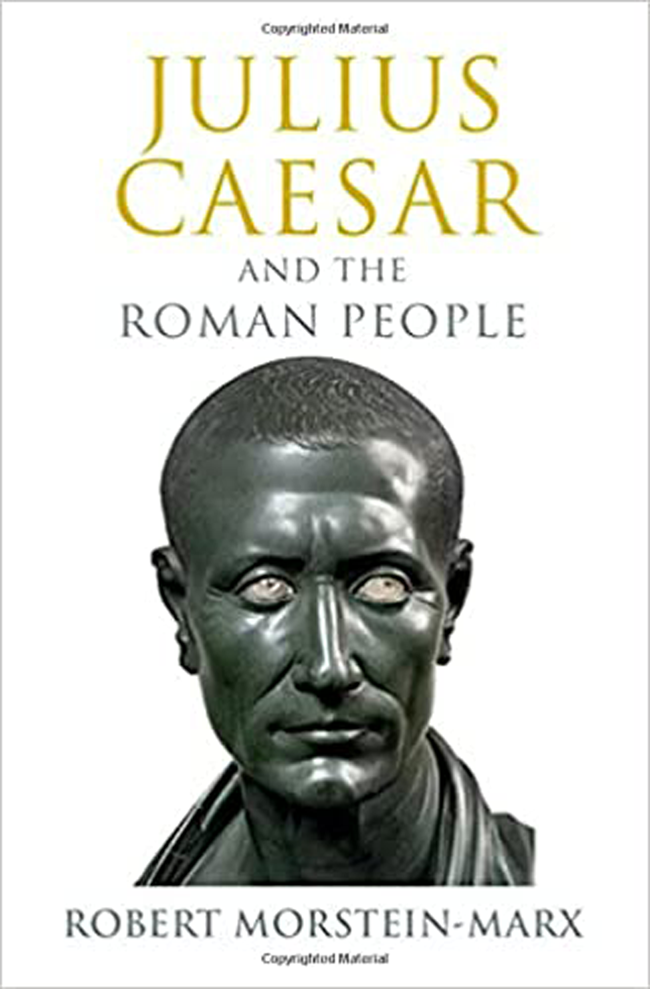
At the outset of his excellent new book, Robert Morstein-Marx reminds his readers what a crowded field the study of Caesar's life and career has become in the last decade. His intention in adding to it is twofold: to demonstrate that the Late Republic was still ‘alive and kicking’: a fully participative democracy wherein the Roman People played a much more significant role than is often assumed; and to challenge the teleological perspective on Caesar's career, demolishing the idea that he aspired to autocracy from the beginning of his career and that he was a radical popularis.
Between the introduction and conclusion, the book is divided into eight chapters, each focusing on a period or specific point in Caesar's political career. In chapters two and three, ‘The Early Caesar’ and ‘Caesar's “Entry into History”: the Catilinarian Debate and its Aftermath’, Morstein-Marx examines Caesar's career before his consulship, which he argues was entirely in keeping with republican tradition: Caesar sought military glory and popularity in the style of Scipionic hero of the past. He revels in dismissing anecdotes which have become embedded in Caesar's story, such as his brief suspension from his praetorship, which Morstein-Marx argues would not have been in the Senate's power (or interests) to enforce, since it would encroach on the right of the People to elect magistrates. As for Caesar's proposal in the Catilinarian debate, Morstein-Marx argues that he was offering the senate a lifeline, anticipating a significant backlash against the condemnation of the conspirators. Chapter four examines Caesar's first consulship, arguing that the optimates’ opposition to Caesar's legislation was both short-sighted and far more out of keeping with republican precedent than anything Caesar himself did. Chapter five, ‘Caesar in Gaul’, discusses the widespread support for and popularity in Rome of Caesar's campaigns, and begins to tackle the thorny subject of the political events leading to the (importantly, not inevitable) outbreak of war in 49, which is continued in the next chapter, ‘No Return’. Morstein-Marx's definition of dignitas as the prestige and honours given by the People fuels his argument that Caesar was determined not to be cheated of his triumph and upon his return from Gaul by a small clique of indefatigable enemies – in fact, he was upholding the will of the People by defending their ‘ancient rights’ to bestow upon him his just reward for his outstanding military achievements. Morstein-Marx lays the blame for the outbreak of war squarely at the feet of Marcellus and the small clique of optimates who declared Caesar an enemy of the state in early 49. In the seventh chapter, ‘Taking Sides’, Morstein-Marx explains that negotiations continued until Pompey left for Greece, undermining the traditional idea that Caesar's crossing of the Rubicon was a decisive moment. He then examines the motives of the men who joined Caesar, concluding that ‘Boni aplenty made their way back to Caesar's Rome rather than flocking to Pompey's camp or making their way to the nearest port’, demonstrating that Caesar was certainly not seen by many as a rebellious outsider, but as a war hero, who would further their political careers. The title of chapter eight, ‘Caesar's Leniency’, challenges the typical view of Caesar's clementia as an expression of his dominance and tyranny. Morstein-Marx argues that the purpose of Caesar's consistent policy of sparing his captured enemies was to ‘win the peace’; he also points out that ‘Not a single case is known of a Pompeian rejecting Caesar's offer of leniency when it was given’ and that mercy had generally positive connotations. However, most interestingly, Morstein-Marx also explains that this policy created serious problems for Caesar: in sparing and even rewarding his enemies, he left himself fewer ways and means to reward his friends, creating the sort of resentment that contributed to his assassination. The last chapter, ‘En-route to the Parthian War’, deals with the implosion of the Caesarian party and Caesar's preoccupation with his long-planned Parthian campaign. As works on Caesar's career must eventually do, Morstein-Marx finally turns to the causes of Caesar's assassination, which are explored in satisfying detail. One of the most important, he argues, is that that many of the conspirators resented the offices Caesar allowed them as much as those who missed out, because ‘honores obtained as a personal favour rather than by a judgment of the People were in fact no “honor” at all.’
Almost every page of Julius Caesar and the Roman People is stuffed full of stimulating arguments, which, when considered together, encourage a thorough rethink of politics in the Late Republic and are likely to spark energetic discussion in the classroom; it is difficult to do its richness justice in a short review. It is a challenging book in many respects, not least its assumption that the reader is intimately familiar with the period. However, Morstein-Marx's thesis is clear from the outset, repeated throughout, and summed up thoroughly in the conclusion, making his arguments accessible to keen sixth formers.
Overall, I would recommend Julius Caesar and the Roman People as essential reading for anyone teaching or studying the Late Republic.

